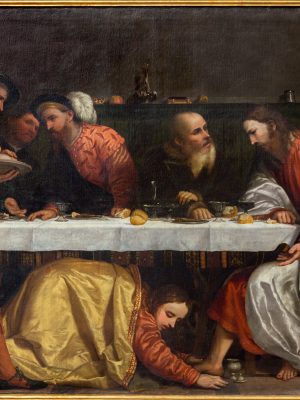Considered the Queen of Virtues, humility is the root and source of our emulation of Christ. In Thomas à Kempis’s classic work, Humility and the Elevation of the Mind to God, the brilliant theologian treats this virtue of virtues with rich spiritual advice that will advance you along the narrow way.
“Learn from me, for I am meek and humble of heart,” says the Lord. Our highest teacher and lawgiver, Jesus Christ, urged us to learn the virtue of humility. For whoever cultivates this marvelous virtue will quickly arrive at spiritual perfection. But without humility, no amount of study of Sacred Scripture or theology, nor any efforts at good works are able to achieve anything lasting. In vain are all our labors unless they are accompanied by humility.
Lesson 1
The very first lesson of Christ is, therefore, humility of heart; for this is the foundation of all virtues and indispensable to the attainment of eternal salvation. Whoever desires to receive grace now and eternal life in the world to come should, therefore, study Christ’s lesson and example of humility with diligence. But whoever neglects humility will lose any benefits their good thoughts and works would otherwise have gained them.
It behooves each Christian soul to meditate carefully on the teachings of Christ. This includes all religious, all priests, all bishops, all servants, all nobles, all commoners, all the educated, and all the simple. And Christ teaches us humility, not pride. He teaches us useful things, not vanities. He teaches what is true, not what is false; what is heavenly, not what is earthly.
Lesson 2
Any person who imitates the example of Christ will quickly become wise and happy. Humility was a particular virtue of Christ; it is therefore feared by the devil and despised by the world. But those who hold it firmly in their hearts are pleasing to God and his angels. Such people will have a secure and blessed passage from this world to the next in accordance with Christ’s words, “Blessed are the poor in spirit, for theirs is the kingdom of heaven.”
Without humility, there is neither salvation nor real virtue. Nor can any action done without humility be pleasing to God. Any work or deed—no matter how noble or persevering—achieves nothing for the soul if it is motivated or accompanied by pride and arrogance.
Profound humility is a stronghold of all the virtues and triumphs over all their enemies. The one to whom humility is granted shall exult in the grace of Christ. For it makes a person like the Lord’s intimate friend, who will willingly and joyfully submits himself to whatever Divine Providence determines. The truly humble person ascribes all good things he does to his Creator and is willing to resign himself in all imaginable situations.
Lesson 3
The person who is intent upon gaining the approval of others and being thought of as great becomes more and more distant from God. And such people pass away like the vanishing smoke or fading shadows.
Everyone who is proud becomes impure in the sight of God. Proud people do not truly know themselves, nor do they perceive their own calling, condition, and destiny clearly. The more pride raises up one’s own self-estimation, the more liable one becomes to the judgment of God. The one who climbs high in pride, raises himself up for an inevitable fall. The humble person, however, who keeps his feet firmly planted on the ground, will stand securely.
Hidden pride is a most pernicious vice, the more so since it is not recognized and does not recognize itself. On the outside, it may appear gentle, mild, and even humble. Yet inside, it burns away bitterly. The person who is subject to such pride becomes inordinately elated when he is successful but is disturbed and dejected in the face of adversity or failure.
This article is taken from a chapter in Humility and the Elevation of the Mind to God by Thomas à Kempis, which is available from TAN Books.








